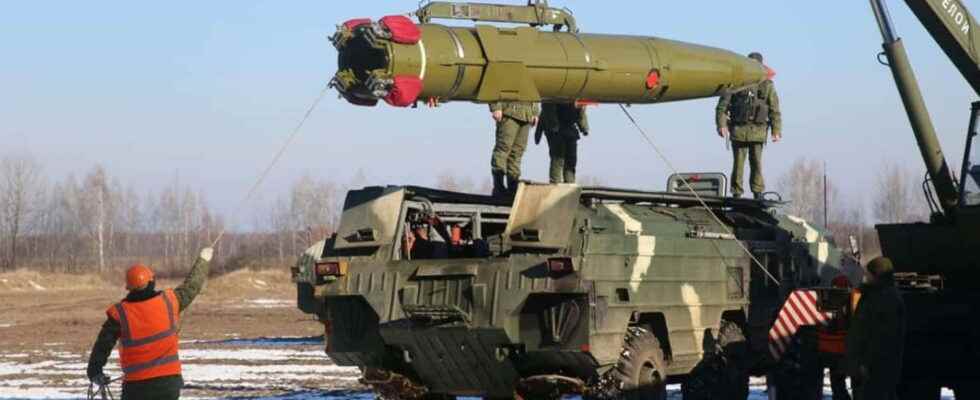NUCLEAR WAR. The nuclear threat hangs over the war in Ukraine. Russia has the largest nuclear arsenal but launching an atomic bomb would bring the conflict into a new dimension. Should we fear a 3rd World War?
Vladimir Putin reminded us that Russia is one of the “greatest nuclear powers in the world”. This dominant position makes Europe, the United States and the whole world fear the use of a nuclear attack on Ukraine while the Russian offensive is slipping and Russia is bearing the full brunt of the Union’s economic sanctions. European. While the nuclear threat has been raised on the side of the Kremlin, Western governments are showing moderate concern. In Washington, the White House says it has not seen any “concrete” movement that could prove the threat launched by the President of the Russian Federation, and in France, the Minister of Foreign Affairs, Jean-Yves Le Drian, responded to the evil by evil and assured that “the Atlantic Alliance is also a nuclear alliance”. The positions to be taken in the face of the hypothesis of a Russian nuclear attack are still questionable, but one thing is certain: the use of the nuclear bomb would tip the war in Ukraine into an international and much more devastating dimension.
Between words and deeds, there is a world. If Vladimir Putin has several times seemed to refer to his nuclear arsenal, he has never named it explicitly and no military movement of Russian troops reflects the preparation of an attack of this magnitude. Moscow is instead focusing on the assaults carried out and sometimes repelled in Ukraine and on the maintenance of its economy after the historic sanctions imposed by the European Union and the United States. However, the decisions of the Western powers are understood by Moscow as “unfriendly measures in the economic field” and “aggressive statements”, according to the speech and the announcement by the master of the Kremlin of the alerting of the “deterrent forces “, Sunday, February 27.
Is the risk of a nuclear attack in Europe real?
A few days after the announcement of the alert of the deterrent forces by Russia, the United States keeps an eye on the Russian army and affirms not to have “seen anything concrete as a consequence of [la] decision [de Vladimir Poutine]”. So much so that the White House has decided not to raise its level of alert and denounces “unnecessary and dangerous provocative rhetoric” on the part of the Kremlin.
Specialists believe that the use of the nuclear threat by Russia serves rather as a political alarm signal. President Putin brandished the hypothesis of a nuclear attack the day before the organization of talks between Russia and Ukraine. The speech was therefore a way to sit down at the negotiating table by having established a balance of power to more easily obtain the surrender of Ukraine. Unfortunately for Moscow, the announcement did not have the expected effect on the Ukrainian delegation, which is sticking to its guns and demanding the withdrawal of Russian soldiers. Vladimir Putin also addressed Europe and the United States and warned them “that in the event of military interference in the conflict with Ukraine, he reserved the option of using nuclear weapons”, according to Rafael Loss, specialist in questions of nuclear doctrine at the European Council on International Relations interviewed by France 24. There again, the Westerners did not withdraw from the Ukrainian file after the speech of the Head of State preventing Russia from establishing a political blackmail and to sort out profit from it.
There is also a strong chance that Vladimir Putin’s speech is only a verbal threat: Russia has a lot to lose by launching a nuclear attack first. Moscow would certainly be bombarded in return by Western armed forces and the Russian government would be even more isolated on the international political spectrum. Despite all these counter-indications, given the mounting sanctions and the offensive that is not going as well as expected, the use of nuclear weapons seems to be Russia’s last card to play, summarizes Rafael Loss.
Will the war in Ukraine trigger a Third World War?
Russia and Ukraine remain for the time being the only countries to take part directly in the conflict on the military level, but this confrontation is only the crystallization of a new cold war between Russia and NATO. The confrontation between the eastern bloc and the western bloc is not recent, it has simply gained momentum with Ukraine’s desire to get closer to the opponent from Moscow. A world ideological war is therefore already being played out but it occupies, for the moment, only the diplomatic field.
The seizure of arms by Russia and the invasion of Ukraine could change the situation. Ukraine’s integration into NATO, the European Union or even direct intervention by these organizations in the conflict would be reason enough to push Vladimir Putin to attack Europe militarily. In such a situation, the West would be forced to respond and the confrontation would no longer be only diplomatic or economic as is currently the case. After discussions and negotiations, the West took its responses one step further by adopting economic sanctions against Russia. Military attacks, and in the worst case nuclear, would be the most dangerous level of this opposition between Russia and the West.
